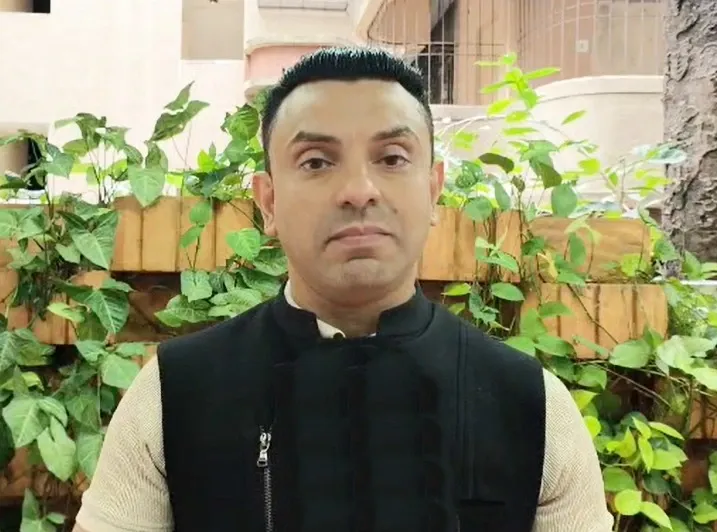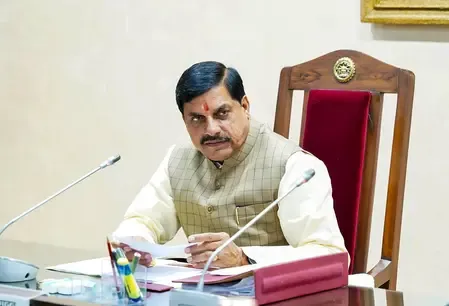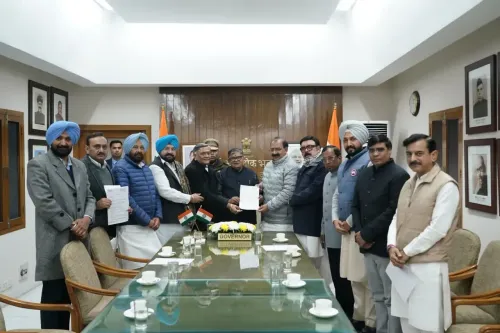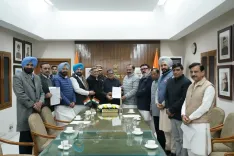Is 'Match-Fixing' Behind Minority Remarks Before Bihar Elections?

Synopsis
Key Takeaways
- Tehseen Poonawalla accuses key political figures of orchestrating divisive strategies.
- The focus on communal politics overshadows pressing issues like unemployment.
- Owaisi and Rijiju's exchange highlights the polarising nature of contemporary politics.
- Calls for prioritizing governance over divisive tactics resonate in the current political climate.
- Voter identification challenges raise practical concerns for migrant workers.
Pune, July 8 (NationPress) Political analyst Tehseen Poonawalla on Tuesday accused Union Minority Affairs Minister Kiren Rijiju and AIMIM’s Asaduddin Owaisi of engaging in a “match-fixing” scheme aimed at polarising voters ahead of the Bihar Assembly elections.
The heated discourse commenced on Monday when Owaisi rebuffed Rijiju’s assertion that minorities in India receive more benefits than the majority.
Owaisi termed it “rights, not charity,” branding Rijiju as the “Minister Against Minorities” and claiming that “Indian Muslims are no longer citizens… but hostages.”
In an interview with IANS, Tehseen Poonawalla remarked that the timing and tone of this verbal clash indicate coordination, not coincidence.
“There is ‘match-fixing.’ This entire matter appears to be a ‘match-fixing’ between the BJP and Owaisi, solely to polarise the Bihar elections,” he expressed to IANS.
Poonawalla highlighted that the BJP, under Hindu leadership at the Prime Minister’s Office, has held power for 11 years.
“If Hindu society is receiving fewer rights, then who is to blame? If Rijiju possesses such knowledge, why hasn’t he communicated it to Prime Minister Modi?”
The analyst criticized Owaisi's tendency to focus on Bihar's electoral issues from Hyderabad, exacerbating communal divides.
“Owaisi’s children are likely to study abroad, BJP leaders may buy homes in Dubai, yet ordinary Hindus and Muslims will continue to battle each other over religion. There’s no discourse on education, health, or jobs,” he pointed out.
“The emphasis is solely on Hindu-Muslim politics. If Hindus are under threat, why aren't BJP leaders’ children protesting? And if Muslims are endangered, why aren’t Owaisi’s children doing that?”
Poonawalla elaborated: “The real issues are unemployment, lack of education, and inadequate health services — not religion.”
In response to the alleged misconduct of Raheel Shaikh, son of MNS leader Javed Shaikh, who reportedly clashed with a Marathi woman influencer after a drunken incident, Poonawalla condemned both the perpetrator and his political affiliations.
“The state Raheel was found in — drunk and shirtless — warrants the Mumbai Police to have put a leash on him and paraded him on the street. No woman, regardless of her background, should face insult or harassment. Such behavior is intolerable,” he asserted.
He further denounced the MNS as “cheap goons” involved in threats and violence, empowered by “Raj Sahab’s poisonous speeches.”
Poonawalla cautioned that until Raj Thackeray and his party members face legal repercussions, “these intoxicated and unruly individuals will persist in their actions.”
On Tejashwi Yadav, Leader of Opposition in the Bihar Assembly, opposing a special voter revision initiative, Poonawalla concurred, labeling it poorly timed: “The last such initiative occurred in 2003 — just one year before the Lok Sabha elections and two years prior to the Bihar polls.”
He raised practical concerns, noting that many migrant workers from Bihar in other states might struggle to provide the 11 documents required for voter identification.
“When my voter card was created in Pune, I only provided Aadhaar. Tejashwi Yadav’s wife’s Aadhaar was accepted as well. Why the exclusion now?” Poonawalla questioned.
He criticized the Election Commission’s inconsistency: while Aadhaar is mandated by law, it is being dismissed under the commission’s guidelines.
“Why is it tied to bank accounts and phone numbers yet excluded from voter verification?”
He condemned the unexpected drive as a hasty, ad-driven campaign devoid of transparent government directives. He urged the Election Commission to fulfill its constitutional obligations and clarify why Bihar necessitates a special revision now, so close to elections.
Poonawalla concluded: “This isn’t about safeguarding rights or rectifying inequalities — it’s about stoking communal divides right before a significant state election. The genuine challenges — jobs, health, education — are being sidelined.”
He called upon both political leaders and independent bodies like the Election Commission to prioritize governance over divisive tactics.










